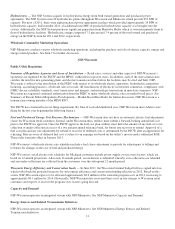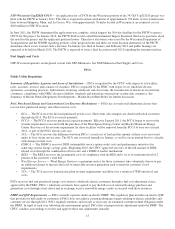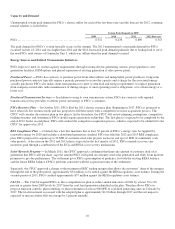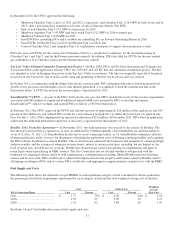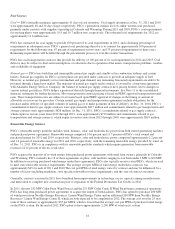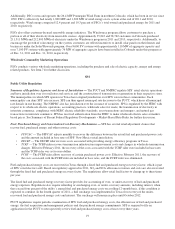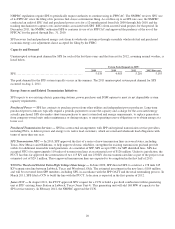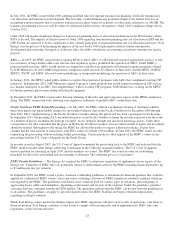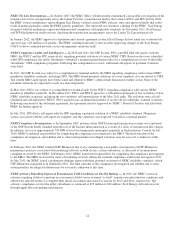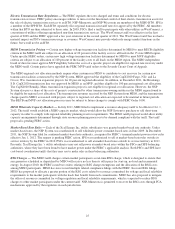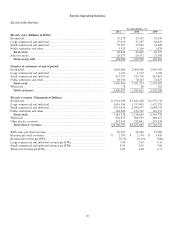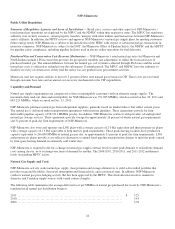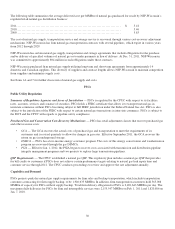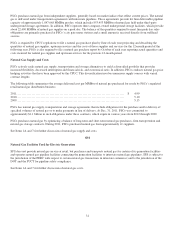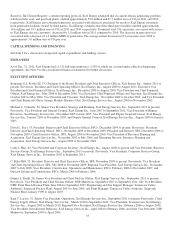Xcel Energy 2011 Annual Report Download - page 33
Download and view the complete annual report
Please find page 33 of the 2011 Xcel Energy annual report below. You can navigate through the pages in the report by either clicking on the pages listed below, or by using the keyword search tool below to find specific information within the annual report.23
In July 2011, the FERC issued Order 1000 adopting modified rules for regional transmission planning, wholesale transmission
cost allocation and transmission development. The new rules would eliminate any preferential right at the federal level for an
incumbent transmission provider to construct transmission facilities subject to regional cost allocation, referred to as a ROFR. The
transmission planning processes will be subject to additional tariff revisions subsequent to Order 1000 compliance filings due in
October 2012.
Order 1000 will require significant changes in transmission planning and cost allocation mechanisms in the WestConnect where
PSCo is located. The impacts of the provisions of Order 1000 regarding transmission planning and cost allocation on SPS and the
NSP System are expected to be less significant as they already participate in regional planning and cost allocation processes. Xcel
Energy is in the process of determining the impacts of the new Order 1000 requirements related to future transmission
development and ownership. Irrespective of the new rules, the utility subsidiaries are pursuing several new transmission facility
projects.
ARCs — In 2009, the FERC adopted rules requiring RTOs to allow ARCs to offer demand response aggregation services to end-
use customers of large utilities unless the relevant state regulatory agency prohibited the operation of ARCs. Under MISO’s
proposed tariff revisions, ARCs would operate in competition with the state-regulated retail demand response programs offered
by NSP-Minnesota. In 2010, MISO requested its compliance tariff revisions be effective in June 2010, and the MPUC, NDPSC,
SDPUC, PSCW, and MPSC all issued orders prohibiting, or temporarily prohibiting, the operation of ARCs in their states.
In January 2011, the MPUC asked public utilities to explore the potential of programs with ARCs that compliment existing CIP
initiatives. In September 2011, NSP-Minnesota agreed to propose a pilot program that would expand existing retail CIP services
in a manner analogous to an ARC, but complementary with its existing CIP programs. NSP-Minnesota is waiting on the MPUC
for further guidance prior to proceeding with the pilot program.
In December 2011, the FERC issued orders denying rehearing of the rules and approving most aspects of the MISO compliance
filing. The FERC retained the rules allowing state regulatory authorities to prohibit ARCs within their state.
Pacific Northwest FERC Refund Proceeding — In July 2001, the FERC ordered a preliminary hearing to determine whether
there were unjust and unreasonable charges for spot market bilateral sales in the Pacific Northwest for December 2000 through
June 2001. PSCo supplied energy to the Pacific Northwest markets during this period and has been a participant in the hearings.
In September 2001, the presiding ALJ concluded that prices in the Pacific Northwest during the referenced period were the result
of a number of factors, including the shortage of supply, excess demand, drought and increased natural gas prices. Under these
circumstances, the ALJ concluded that the prices in the Pacific Northwest markets were not unreasonable or unjust and no refunds
should be ordered. Subsequent to the ruling, the FERC has allowed the parties to request additional evidence. Parties have
claimed that the total amount of transactions with PSCo subject to refund is $34 million. In June 2003, the FERC issued an order
terminating the proceeding without ordering further proceedings. Certain purchasers filed appeals of the FERC’s orders in this
proceeding with the U.S. Court of Appeals for the Ninth Circuit.
In an order issued in August 2007, the U.S. Court of Appeals remanded the proceeding back to the FERC and indicated that the
FERC should consider other rulings addressing overcharges in the California organized markets. The U.S. Court of Appeals
denied a petition for rehearing in April 2009, and the mandate was issued. The FERC has issued an order on establishing
principles for the review proceeding and encouraging a settlement. The settlement process is in progress.
FERC Penalty Guidelines — The Energy Act required the FERC to adopt new regulations to implement various aspects of the
Energy Act. Violations of FERC rules are potentially subject to enforcement action by the FERC including financial penalties up
to $1 million per day per violation.
In September 2010, the FERC issued a policy statement establishing guidelines to determine the financial penalties that would be
applied for violations of FERC statutes, rules and orders, including violations of NERC mandatory reliability standard violations
investigated by the FERC. The guidelines established a base violation level for various types of violations, plus mitigating or
aggravating factor adders and multipliers, depending on the nature and severity of the violation. Under the guidelines, penalties
can range between a minimal amount and $290 million. The guidelines indicate that the FERC can deviate from the guidelines in
its discretion. The guidelines can apply to any investigation where the FERC Staff has not begun settlement negotiations
regarding an alleged violation.
While Xcel Energy cannot predict the ultimate impact new FERC regulations will have on its results of operations, cash flows or
financial position, Xcel Energy continues to take action to comply with existing rules and to implement new FERC rules and
regulations as they become effective.



